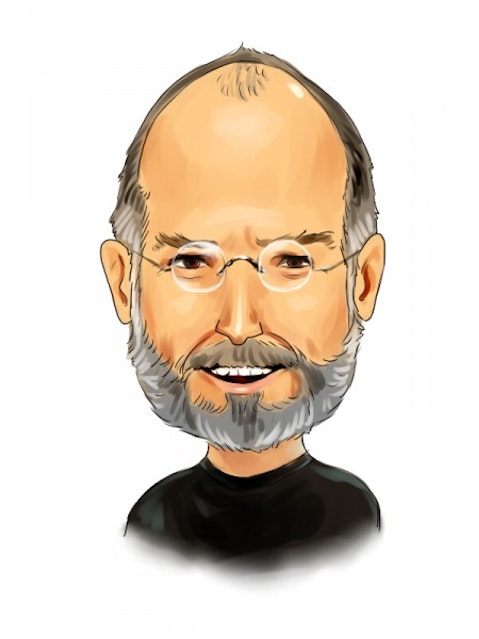It has a $420 billion market capitalization, so it is nearly halfway to a trillion. It trades at only 10 times trailing earnings, meaning that it is hardly overpriced and may even get some multiple expansion. Shouldn’t Exxon Mobil Corporation (NYSE:XOM) be in the mix for the potential to be the first public company to be worth a trillion dollars? Read more analysis of Exxon Mobil including comparisons to its peers in oil & gas such as Chevron Corporation (NYSE:CVX) and BP plc (NYSE:BP).
Let’s make no mistake: if Apple Inc. (NASDAQ:AAPL) continues to grow its business at a rate similar to what it has done over the last few years, it will easily get to a trillion dollar market cap- a 60% increase from its current valuation, for a stock that is up 62% so far in 2012. And we’d be hard pressed to say that the stock price has outpaced the business, with Apple’s trailing P/E being only 16 (note that the statistics so far indicate that Exxon is currently earning higher profits than Apple Inc.). If we had to guess, we would say that Apple Inc. (NASDAQ:AAPL) is more likely than any particular company to reach a trillion dollars. But there is a scenario in which Exxon Mobil Corporation could be the first to cross the ten-figure mark:
Apple Inc. would have to stumble. Whether because of a poor product launch or because competition in the tablet and smartphone markets eats away at its market share and profit margin, Apple’s growth needs to somehow slow enough to blunt future increases in its stock price to about 10% per year. At that rate, it would take five years for the company to be worth a trillion dollars. Economic theory argues that as these markets mature and more companies start providing products, prices and margins will come down. Just as importantly, Apple Inc. (NASDAQ:AAPL) would have to cease coming up with groundbreaking successful products.
Global growth would have to be strong. Exxon Mobil’s stock price is connected to oil and natural gas prices, which in turn are determined by the supply of and demand for energy. The demand for energy, in turn, is derived from global economic growth. In the 2000s, growth was strong- despite gripes in the U.S. about a “lost decade” the world as a whole saw a remarkable rise in per capita GDP- and between the end of 2002 and today (a little less than 10 years) the price of oil has risen from under $40 per barrel to around $90. Exxon Mobil, meanwhile, is up 157% and a rise in oil prices could pull its business higher; we don’t expect prices to double in the short term, but seeing good growth could make investors more confident in the long-term prospects of the company and pull its P/E higher. Exxon Mobil would also be helped by a recovery in natural gas prices, which are currently low due to a supply glut in the U.S. This is partly because limited transportation infrastructure exists to bring natural gas to markets such as China where prices are higher. In time, we think that the natural gas side of Exxon Mobil’s business (the supermajor completed its acquisition of XTO Energy in 2010) should do better.
In this scenario, with its stock rising 15-20% per year, Exxon Mobil Corporation could get to $1 trillion in about five years and edge out Apple. It would also likely beat out Google Inc (NASDAQ:GOOG): that company has good growth prospects in a number of markets, and it would be the largest beneficiary from any Apple setback (though it would also see lower margins and market share if competition in the tablet and smartphone markets heats up). However, Exxon Mobil has a substantial head start as its market cap trumps Google’s by 71%. So there is a window for Google Inc (NASDAQ:GOOG) to outperform Exxon Mobil over the next three to five years and still lose the race.
We actually considered Chevron and BP to possibly be cheaper than Exxon Mobil when we looked at the company earlier this month, so it might not even be the best buy in the oil & gas industry. However, we think that because of its large market capitalization and the dynamics of the energy sector it has the potential to be the dark horse in the race to $1 trillion. Read more of our coverage about Apple Inc. (NASDAQ:AAPL) and about Google Inc (NASDAQ:GOOG).






